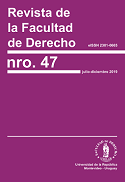Discriminación por orientación sexual y derechos de la seguridad social en la jurisprudencia de la Corte Interamericana de Derechos Humanos (Corte IDH) y del Tribunal Europeo de Derechos Humanos (TEDH). ¿Una historia de divergencias?
DOI:
https://doi.org/10.22187/rfd2019n47a5Palabras clave:
Derechos Humanos, orientación sexual, discriminación, TEDH, Corte IDH, derechos seguridad social, incrementalismo, consenso europeo, consenso interamericanoResumen
Desde hace unos años los sistemas de protección universal y regional de derechos humanos convergen en la extensión de las causales de prohibición de discriminación como en el caso de la orientación sexual. Sin embargo, un estudio micro de las similitudes y divergencias en el examen de igualdad por trato diferenciado por orientación social en el acceso a los derechos de la seguridad social, demuestran las divergencias entre la Corte IDH y el TEDH. Así este trabajo sostiene que el TEDH asume un enfoque incrementalista condicionado para el respecto del reconocimiento de derechos de las personas LGBTI frente al enfoque incrementalista categórico de la Corte IDH como speed adopter. La falta de consenso europeo fáctico sobre el reclamo y la concesión de un amplio margen de apreciación estatal ganan primacía frente al examen de igualdad en el ámbito del TEDH. Mientras que la Corte IDH aplica un examen de igualdad intensivo si el trato diferenciado se basa en la orientación sexual de las personas aunque no exista consenso interamericano en el tema. El artículo concluye así diferenciando dos tipos de incrementalismo como enfoque de adjudicación en derechos humanos.
Descargas
Publicado
Cómo citar
Número
Sección
Licencia
Los autores conservan sus derechos de autor y ceden a la revista el derecho de primera publicación de su obra, el cuál estará simultaneamente sujeto a la licencia Creative Commons Reconocimiento 4.0 Internacional License. que permite compartir la obra siempre que se indique la publicación inicial en esta revista.



